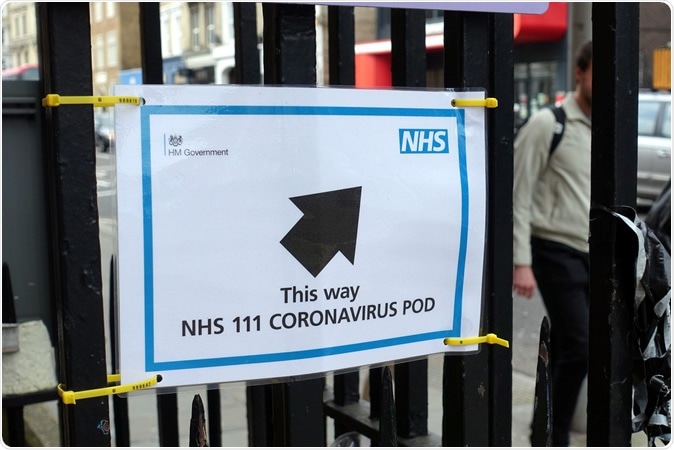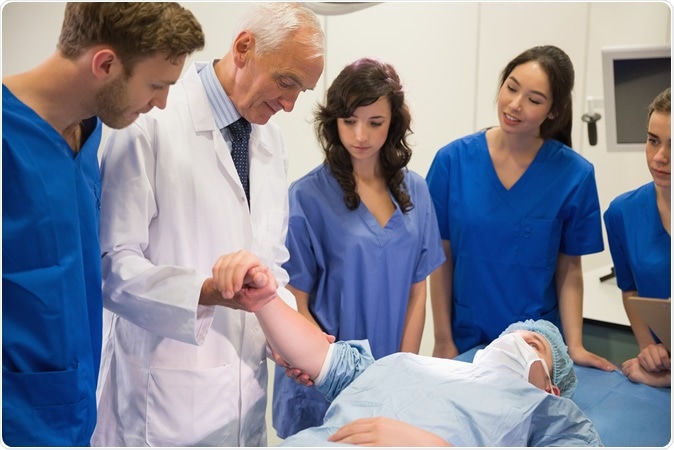In a bid to boost the numbers of registered doctors to tackle the ongoing COVID-19 outbreak, the United Kingdom is on the way to speed up the final year medical courses for doctors. The government is planning on waiving the clinical examinations for the students and using alternative methods to assess them so that they are ready to tackle the disease burden caused by the novel coronavirus.

Central London hospitals set up Coronavirus Assessment Pods. Image Credit: Brian Minkoff / Shutterstock
Joining hands to create more workforce
There is a severe crisis of registered medical practitioners across Britain, and the NHS is struggling to meet the demands placed by the growing number of cases infected by the virus.
There are a total of 42 medical schools under the Medical Schools Council (MSC). The MSC has advised the medical institutes to make sure that final year students are prepared to qualify for their final year of medical studies even if they have to skip clinical examinations. These junior doctors would then receive provisional registration from the General Medical Council (GMC). They would be able to join the workforce earlier said, experts.
MSC speak
In a letter from the MSC, the Chairpersons and Chief executive have said, “It is important that medical schools do not delay qualification and so prevent new doctors joining the workforce in the summer. We suggest that finals are simplified as far as possible, consistent with testing the necessary learning objectives. We also suggest patients are not used in final clinical exams. Ultimately it may not be possible to deliver any meaningful formal clinical exams, in which case the medical school should review the alternative methods of assessment that are available to them (previous exam results, placement grades etc.).”
How to go about it?
Experts have said that the final year of medical education entails training with not only books and information but also live patients. Final clinical examinations are part of the qualifying exams following which the students would directly deal with real-life patients. Due to the fear of the spread of coronavirus, clinical work had to be suspended for the students, and this further delayed their qualification. This delay could be made up by waiving the final exams so that more junior doctors join force and are thus able to meet the NHS doctor shortages.
Missives
Last week medical students studying at the University of Cambridge were informed that their clinical teaching would end soon, and the university would ask the GMC for permission to cancel the clinical examinations. GMC experts added that not only would the exams take up much of the time, they would also involve over 200 doctors and GPs for over two weeks.

Medical students and professor. Image Credit: Wavebreakmedia / Shutterstock
This examination process would also expose the students to a large number of patients who could be potentially carrying Covid-19 infection. Prof. Patrick Maxwell, the head of Cambridge’s school of clinical medicine in an email to the students wrote, “I am afraid that we have had to make some extremely difficult decisions, based on the principle that students going in and out of clinical environments could be an unnecessary source of virus transmission, they may be putting their patients and themselves at greater risk, and there may be too few staff available to deliver formal clinical teaching, either through the pressure of work or illness.” The final written examinations have been completed by the students. Just the clinical examinations remain. The assessment of the students will now be based on their earlier placements, rotations, and assessments said the experts.
Prof Louise Richardson, vice-chancellor of the University of Oxford, in an email to staff, wrote, “The medical science division is canceling all clinical teaching until further notice in order to release clinical teachers to the wards.” University College London is also freeing up the clinical academics for dealing with the corona crisis. Prof David Lomas, the university’s vice provost for health, said, “Many of our clinical academics may shortly be asked to support clinical services as the NHS faces increased pressure during the coronavirus outbreak. We have taken the decision to release colleagues from their UCL responsibilities to enable them to make a decision on this.”
During the crisis, the MSC has said that the students would be enabled to work primarily as NHS’s 111 call handlers and first responders on the phone. They would also be able to take over from the overworked staff to perform non-critical roles in the hospitals. The letter added, “We predict that many medical students who have already passed finals will want to volunteer to work in the NHS, and we encourage this. Important principles are that it must be their own decision, they should not be allowed to work beyond their competencies, they should be given full necessary personal protection and full instruction in its use, and they should be fully supervised with clear governance arrangements.” “Opportunities may be available for post-finals medical students to assist in clinical services other than those dealing directly with patients with coronavirus infection. For example, helping in fracture clinics that are repurposed to deal with patients with minor injuries away from the emergency department environment,” the MSC said.